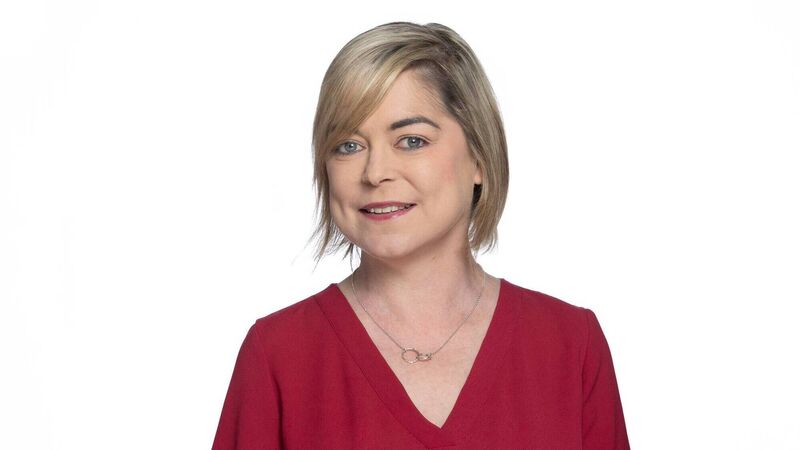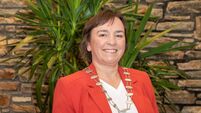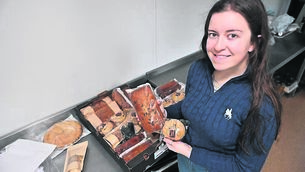Meet the Cork professor teaching others how to stand up to bad behaviour

Professor Louise Crowley, UCC. Picture: Tomas Tyner, UCC.
STARTING with UCC, Cork GAA clubs will be first in the country to take training on consent, recognising sexual harassment and violence, and developing skills to speak up and challenge unacceptable behaviour, empowering them to support team-mates and others in need.
The Bystander Intervention Programme, developed by Professor Louise Crowley at University College Cork (UCC), has already been adopted at third level institutions, schools and workplaces across the country, and will now move from lecture halls to dressing rooms as part of efforts to tackle problematic behaviour.
The development was announced at an event attended by President of Cumann Lúthchleas Gael Larry McCarthy, at which UCC was welcomed to the GAA’s Healthy Club project, an initiative that helps clubs support the holistic health of their members.
Cardiac Screening, a Mental Health Campaign, and Alcohol and Substance Abuse awareness will also form part of the Healthy Club project.
Raising Awareness
Professor Crowley’s journey towards creating the Bystander Project began in 2015 when she was working as Vice Dean for student affairs in the Law School. Accustomed to seeing students panic and drop out late in the academic year, she invited them to come forward with any personal issues that November.
“Only eight out of 160 students came to me. I was struck firstly by how few that was and secondly by the fact that they were all female. I realised our students needed to feel safe about asking for help, and also, in line with my own research in the area of domestic and intimate partner abuse, I recognised the need for students to have an education around abuse and harassment. At that time, it was difficult for students to speak up. There were structures in place, but they weren’t visible enough.

“Students needed to know how to come forward and they needed to know in advance what would happen when they did.”
The response was huge. During our initial two-year pilot programme, students did five hours on average out of a six-hour course when they were asked to do a minimum of three. Many expressed their desire for it to be a university-wide programme in their feedback.
“What was most remarkable was the impact on our male students. They sat in disbelief listening to what their female friends were describing. They shared that they simply had no idea what it was like for them.
“They went from appearing nonchalant to shocked to really becoming allies. They began to understand the impact of a range of behaviours. They just hadn’t seen them before.”
Professor Crowley explains that this is a big part of the problem. Unacceptable behaviours are normalised in our society to the point where we really can’t see them. The issue is that no-one can object to something they can’t see. This work is all about ‘shattering a false consensus’ as she puts it, that certain behaviours are okay when they’re not.
“In the last few sessions, we did role-plays. I was worried about re-triggering or re-traumatising victims, but I checked in with Mary Crilly from the Sexual Violence Centre in Cork and she assured me that in her experience past victims are the strongest advocates for this kind of awareness building work. Her advice turned out to be true; I have received a great deal of positive feedback from victims of harassment and abuse.”
The work with the Law students was rolled out to other faculties but within two years they had only reached 600 students out of a student population of 26,000. This is when the Bystander Intervention Programme went digital.
It is now on the virtual learning platform in UCC and can be completed by staff and students alike, both within UCC and beyond through the university CPD platform.
Dáil Eireann took 100 places this year and Professor Crowley recently visited Stormont to provide training.
“The appetite for this work is huge. When Aisling Murphy was killed last year it absolutely blew up. The whole country was devastated, and there was a real feeling of powerlessness. Men wondered what they could do to help, beyond not being abusers themselves.”
Professor Crowley was particularly taken aback by the numerous emails she received from men following an interview on sports podcast The Second Captains.
“I remember one man saying that he finally got it. He admitted that he had been defensive before, thinking women were just blaming men. He began to see that they just wanted him to step up. My message is always the same. If you don’t say anything, you are part of the problem. But we must empower men first. We must help men to see the problem first, then we have to give them the skills to combat it.”

Building Capacity
The trailblazing academic uses the word ‘capacity often’. She believes in the capacity and goodness of people. She says she speaks to people’s inner hero in her work, opening people’s eyes to their capacity to make things better for everyone.
Before the workshop, only 27% of participants reported feeling they had the necessary skills to intervene during a threatening incident. This became 80% in post-workshop surveys.
This latest exciting expansion of the programme, reaching out to organised sport, is something she sees as key to bringing about widespread and sustainable change.
There is a danger of ‘lad culture’ in sport, she says, fuelled by men existing in a highly competitive, testosterone-driven, tough environment. In that culture, she acknowledges the capacity for gender stereotyping.
“It is a part of the team culture too. Nobody wants to go against the team unit so we must ensure that the values of the team are positive and inclusive. It is extremely difficult for young men in particular to go against the team, so it’s important for us to give bystander training to the whole team together. Through the abstract role plays, they feel more comfortable calling out bad behaviours.”
Part of the bystander training is about highlighting the many options available to bystanders.
“There are so many different things bystanders can do in so many ways.
"For instance, someone who did our course saw a girl looking uncomfortable when a man was urging her to come back to his place. This man was very tall so he just stood between them and didn’t say a single word. The man harassing the young women soon scarpered.”
Professor Crowley is very aware that men can see this training as anti-male, which is why she always starts by saying that most men are good and know what a positive relationship looks like.
But as the training progresses she shows men how small behaviours can be part of the problem. It is all about building awareness and then empowering people to help others.

Changing Culture
The GAA club in UCC is the first third level club to do the Bystander training, delivered through a 90-minute bespoke programme designed by Professor Crowley. She has already done extensive work on campus to raise awareness. All sports players wear the Bystander logo and Bystander hoarding adorns pitches and changing rooms throughout the campus.
“Cracking sports is so critical because sport spans disciplines. Through sport, we can infiltrate all of society and embed positive values.“
These players are role models too. They are ambassadors and they are extremely visible, which is exactly what we need.”
The Professor recently gave a talk to the Cork Health and Wellbeing Committee and is now getting calls from clubs throughout Cork to come and do the training. She will need more funding before this can happen, but she is passionate about making it happen.
“This is about giving young people the language to change our world. It raises awareness and provides them with the necessary skills to intervene.”







 App?
App?





